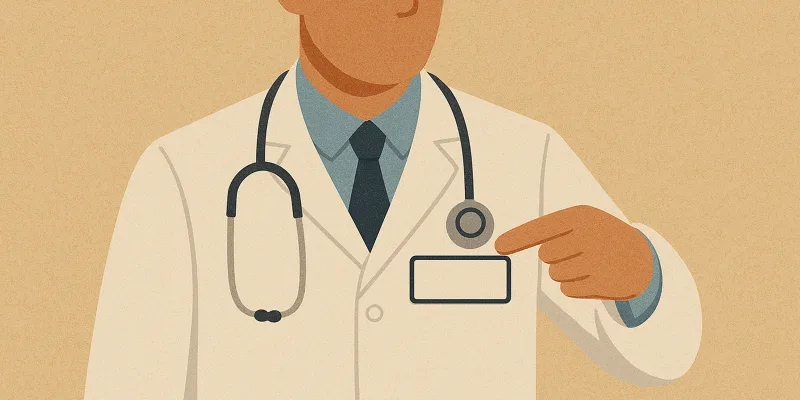
In the 1960s, Lew Goldberg showed that a physician's intuition and judgment can be fatally flawed. Interestingly, the same fatal flaw that Goldberg exposed is the same fatal flaw that causes some of the biggest financial mistakes that doctors make with money. Why aren't doctors rich? Psychology has an interesting explanation that everyone should understand.
Tag along as we dive into the minds of physicians and investors, and explore how their two worlds intertwine. After the deep dive, we will discuss how to defeat this flaw and set ourselves on a path for financial success.
Goldberg's Experiment
In the beginning, Goldberg asked several well-trained radiologists how they set out to determine when people had stomach cancer. The doctors explained that there were seven criteria that they use to make the diagnosis. Goldberg created an algorithm that would strictly adhere to these seven criteria. Thus, he removed many of the psychological hoops that radiologists jump through (and the biases that are produced) when making a decision. Goldberg didn't stop here, though. See, Goldberg was not so much interested in the accuracy of the algorithm. Instead, he was much more interested in how the physicians came to the diagnosis of malignant or benign in the first place. So, Goldberg set up an experiment.
In his experiment, he compared his algorithm, which was built on the criteria provided by the expert radiologists, to the radiologists themselves. He showed dozens of images and asked for a diagnosis. During the study, the radiologists were also shown duplicate images multiple times. However, the duplicates were randomly presented, and separated by many other images.
The Results
The results were surprising. First, though the physicians were the ones with the experience and knowledge to provide the criteria, the algorithm outperformed the doctors by a staggering margin. In fact, the algorithm outperformed all of the clinicians as a group, and even the single most accurate physician involved in the study. Second, many of the physicians made a different diagnosis based on the same exact image. In other words, they saw the same image twice and gave two different diagnoses. Of course, during the testing, they didn't realize it was a duplicate image. Third, the accuracy of the judges did not correlate with their experience. The least experienced doctor was just as likely as the most experienced to make the same mistakes.
Irrational Spending in Intelligent People
This study (and many others like it) show that humans are irrational. While we don’t diagnose stomach malignant processes in the same way, the point is the same. How many times has a bad patient outcome impacted the way that you practice medicine in the future (even if there is no evidence to support the change)?
We all do it (or at least have to actively fight against it). We all make exceptions when we shouldn't. Think about the number of times that you have made a purchase that you regret. If you think back to how that decision transpired, there was likely an inner dialogue wherein you explained to yourself why "this time" you "needed" the item you bought. This process involves reasoning your way through a purchase. It's the same process that happened with the radiologists in the study. Instead of following their own criteria strictly, they said, "Well, in this specific case I think this criteria is less important than that one." Unfortunately, the more intelligent you are the easier it often becomes to "reason" your way to a bad decision.
Why Aren't Doctors Rich?
Because we are irrational. Just like everyone else. But we are also really good at reasoning our way through bad decisions. The way to defeat our irrational thinking is by creating a rational financial plan that we can stick to, regardless of what is going on.
If you want a good place to start, consider my book on personal finance. You can also defeat your irrational mind by sitting down when you aren't experiencing a moment of heated passion for a new car, house, or gadget. Then, spend some time discussing what you want your ideal life to look like using the Three Kinder Questions. Once the big picture is squared away, you can take a look at what is preventing you from getting there. If you are like most, it probably has something to do with your high debt burden and lack of assets. If so, you’ll need to start by creating a plan to destroy your student loans, which may involve pursuing student loan forgiveness, refinancing your student loans, or both. It also likely involves creating a practical investing plan. This plan should involve "automatic" payments that go into their designated accounts before you even have a chance to screw things up. This way you can stick to the plan without a chance to rationalize a bad decision. You can look at the plan and determine the best course of action, because you've already outlined it. Just like the algorithm that outlined the criteria for diagnosing cancer.
The Take Home Message: Simplicity Wins Out
The doctors in Goldberg's experiment had the intelligence and education to diagnose cancer. Indeed, they gave him the criteria to make the algorithm in the first place. Yet they failed time and time again because they didn't stick to the plan and reasoned their way to bad decisions. While we don't diagnose stomach cancer these days through plain films, these same biased thought processes still exist. This bias toward irrational decision-making is why simplicity always wins, in both clinical medicine and in personal finance. If you can create a "set it and forget it" financial plan that will get you to your goals, then all that is required is to stick to the plan. This means that there are no "this time it's different" thoughts or "yeah, but buying this would really help us do that!" rationalizations.
As John Templeton so astutely pointed out: “The four most expensive words in the English language are ‘this time it’s different.’"
Don't fall into that trap. Create a plan, and then stick to it. If you do that, you'll be far ahead of your peers. And, if you learn this skill, you just might be a better doctor, too.
Previously published on The Physician Philosopher.







